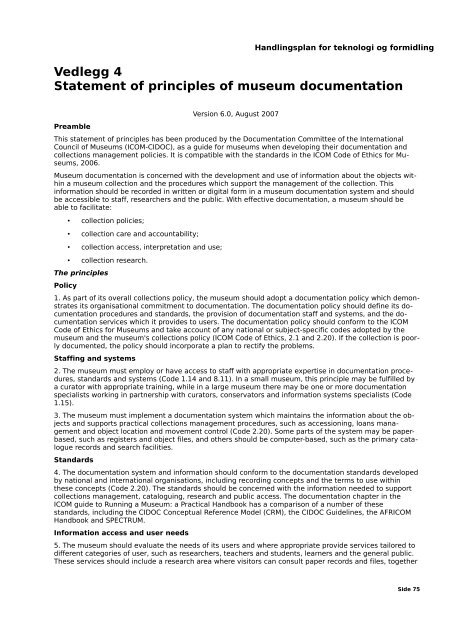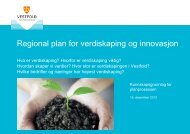Forgjengelig eller tilgjengelig - Vestfold Fylkeskommune
Forgjengelig eller tilgjengelig - Vestfold Fylkeskommune
Forgjengelig eller tilgjengelig - Vestfold Fylkeskommune
Create successful ePaper yourself
Turn your PDF publications into a flip-book with our unique Google optimized e-Paper software.
Handlingsplan for teknologi og formidling<br />
Vedlegg 4<br />
Statement of principles of museum documentation<br />
Preamble<br />
Version 6.0, August 2007<br />
This statement of principles has been produced by the Documentation Committee of the International<br />
Council of Museums (ICOM-CIDOC), as a guide for museums when developing their documentation and<br />
collections management policies. It is compatible with the standards in the ICOM Code of Ethics for Museums,<br />
2006.<br />
Museum documentation is concerned with the development and use of information about the objects within<br />
a museum collection and the procedures which support the management of the collection. This<br />
information should be recorded in written or digital form in a museum documentation system and should<br />
be accessible to staff, researchers and the public. With effective documentation, a museum should be<br />
able to facilitate:<br />
• collection policies;<br />
• collection care and accountability;<br />
• collection access, interpretation and use;<br />
• collection research.<br />
The principles<br />
Policy<br />
1. As part of its overall collections policy, the museum should adopt a documentation policy which demonstrates<br />
its organisational commitment to documentation. The documentation policy should define its documentation<br />
procedures and standards, the provision of documentation staff and systems, and the documentation<br />
services which it provides to users. The documentation policy should conform to the ICOM<br />
Code of Ethics for Museums and take account of any national or subject-specific codes adopted by the<br />
museum and the museum's collections policy (ICOM Code of Ethics, 2.1 and 2.20). If the collection is poorly<br />
documented, the policy should incorporate a plan to rectify the problems.<br />
Staffing and systems<br />
2. The museum must employ or have access to staff with appropriate expertise in documentation procedures,<br />
standards and systems (Code 1.14 and 8.11). In a small museum, this principle may be fulfilled by<br />
a curator with appropriate training, while in a large museum there may be one or more documentation<br />
specialists working in partnership with curators, conservators and information systems specialists (Code<br />
1.15).<br />
3. The museum must implement a documentation system which maintains the information about the objects<br />
and supports practical collections management procedures, such as accessioning, loans management<br />
and object location and movement control (Code 2.20). Some parts of the system may be paperbased,<br />
such as registers and object files, and others should be computer-based, such as the primary catalogue<br />
records and search facilities.<br />
Standards<br />
4. The documentation system and information should conform to the documentation standards developed<br />
by national and international organisations, including recording concepts and the terms to use within<br />
these concepts (Code 2.20). The standards should be concerned with the information needed to support<br />
collections management, cataloguing, research and public access. The documentation chapter in the<br />
ICOM guide to Running a Museum: a Practical Handbook has a comparison of a number of these<br />
standards, including the CIDOC Conceptual Reference Model (CRM), the CIDOC Guidelines, the AFRICOM<br />
Handbook and SPECTRUM.<br />
Information access and user needs<br />
5. The museum should evaluate the needs of its users and where appropriate provide services tailored to<br />
different categories of user, such as researchers, teachers and students, learners and the general public.<br />
These services should include a research area where visitors can consult paper records and files, together<br />
Side 75




